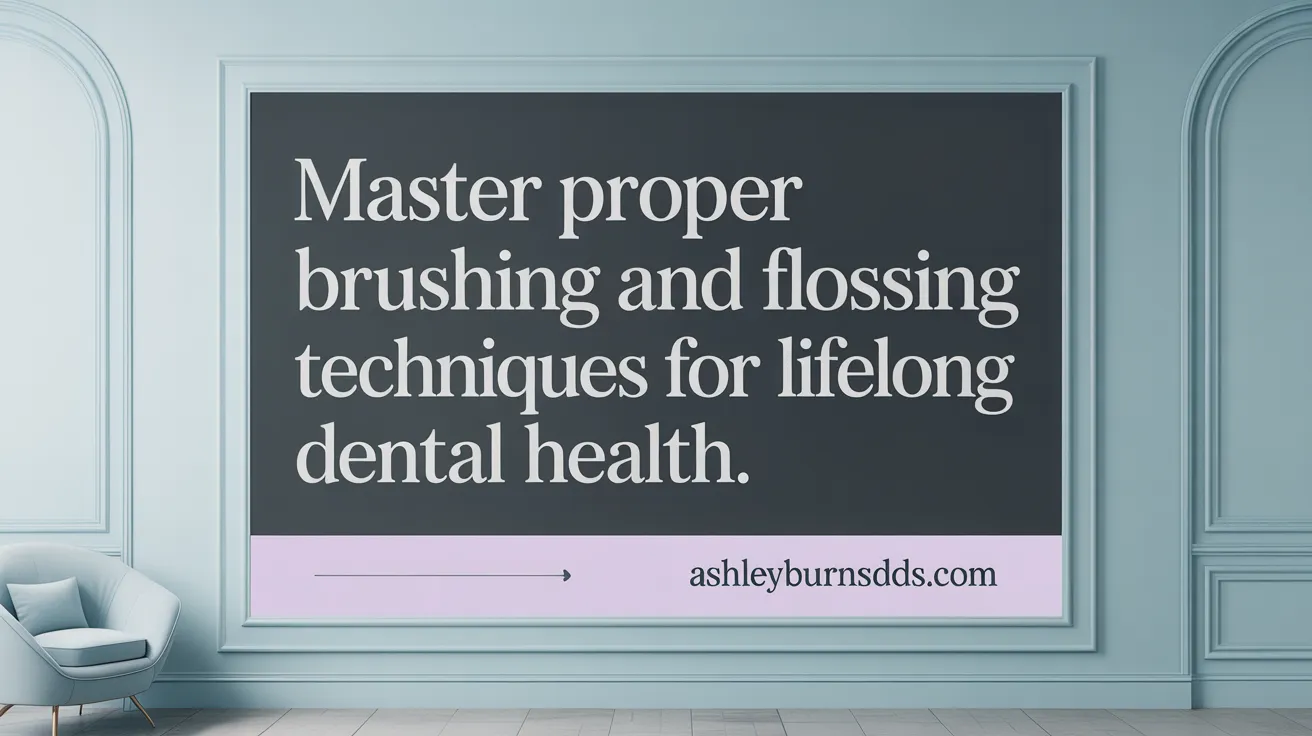Why Age-Specific Oral Care Matters
Oral health is a dynamic continuum that evolves with age, influenced by biological changes, lifestyle habits, and systemic health conditions. Effective oral care strategies require a comprehensive approach addressing the unique dental needs of different life stages—from infancy through older adulthood. This article explores essential practices that promote optimal oral health across all age groups, emphasizing prevention, maintenance, and professional care to support not just the smile but overall well-being.
Foundations of Oral Hygiene: Building Blocks for All Ages

What are the fundamental oral hygiene practices recommended for maintaining dental health?
Good oral hygiene begins with Proper oral hygiene practices like Brushing at least twice daily using fluoride toothpaste and a soft-bristled toothbrush. The toothbrush should be gently angled at 45 degrees toward the gumline to effectively remove plaque. Daily flossing or interdental cleaning is essential for cleaning between teeth where brushing cannot reach. Additionally, Brushing the tongue helps reduce bacteria and breath odor, while the use of an Antibacterial mouthwash can further control plaque buildup and harmful bacteria.
Toothbrushing techniques
Proper technique is key: Oral hygiene tips include using gentle, circular motions rather than harsh scrubbing to avoid gum damage. Brush all surfaces of each tooth including the front, back, and chewing surfaces, spending about two minutes each session. Replace your toothbrush every three to four months or sooner if the bristles are frayed.
Flossing and interdental cleaning
Flossing once a day is vital to remove plaque and debris between teeth and along the gumline, preventing gum inflammation and decay. Interdental brushes may be used as alternatives for wider gaps. Start flossing as soon as teeth touch, usually in early childhood, and continue throughout life.
Importance of fluoride use
Fluoride toothpaste strengthens tooth enamel and helps prevent cavities. Use age-appropriate fluoride amounts: a rice-sized smear for children under 3 and a pea-sized amount for ages 3 to 6. Avoid rinsing immediately after brushing to allow fluoride to remain on teeth longer.
Role of mouthwash
Using an antibacterial mouthwash daily can reduce plaque and freshen breath. However, it should be used at a different time than brushing to avoid washing away fluoride.
Signs of poor oral hygiene
Beware of bleeding, red, or swollen gums, persistent bad breath, mouth sores, or tooth sensitivity—all signs that oral hygiene may be insufficient and dental care is needed (source).
How does tobacco use affect oral health?
Tobacco products significantly increase risks for gum disease, oral cancers, and impaired healing following dental treatment. Avoiding or quitting tobacco is a critical step for preserving oral health.
Why are regular dental visits crucial?
Professional dental exams and cleanings every six months allow for early detection and treatment of problems such as cavities and gum disease. This preventive approach reduces the need for extensive dental work and supports overall systemic health.
Use of ADA-approved products
Selecting oral care products carrying the American Dental Association (ADA) Seal of Acceptance ensures their safety and effectiveness, aiding in maintaining optimal oral health.
Maintaining these oral hygiene foundations benefits all age groups, helping keep teeth and gums healthy throughout life while supporting general well-being.
Oral Health in Early Childhood: Establishing Healthy Habits

When should a child first visit the dentist?
Children should have their first dental visit by their first birthday or within six months of the eruption of their first tooth. This early visit helps establish a dental home and allows for timely identification and management of potential oral health issues. For more information, see Early Dental Care Recommendations.
How can parents prevent cavities in young children?
Before teeth appear, parents should clean their child's gums twice daily with a moist cloth to reduce bacteria. Once teeth emerge, brushing should begin using fluoride toothpaste in age-appropriate amounts—a rice-sized smear for children under three and a pea-sized amount for children aged three to six. Parents should supervise brushing and flossing until children develop the skills to perform these tasks effectively, usually around ages 6 to 10.
Avoiding sugary drinks, especially at bedtime, helps prevent baby bottle tooth decay. Encouraging healthy dietary habits, such as limiting sugary snacks and opting for water or milk, further supports cavity prevention. Additional guidance is available at Brushing Teeth in Young Children.
What preventive measures protect children's teeth from cavities?
Fluoride varnish applications on primary teeth can prevent about a third of cavities. Additionally, dental sealants applied to the chewing surfaces of back teeth provide a protective barrier, preventing up to 80% of cavities in these susceptible areas. Refer to Dental Sealants for Cavity Prevention for more details.
Managing Dental Anxiety in Kids
Creating positive dental experiences from early visits can reduce anxiety. Parents and caregivers should provide reassurance, use distraction techniques, and maintain a calm attitude to help children feel comfortable during dental visits. Learn more about behavioral change techniques for oral health at Tips for Healthy Oral Habits in Children.
By starting oral care early, supervising proper hygiene habits, and using preventive treatments, parents can set their children up for a lifetime of healthy smiles. For comprehensive advice, see Oral Health Care at Every Stage of Life.
Adolescent and Young Adult Dental Care: Navigating Developmental Challenges

Why are orthodontic evaluations important during childhood?
Early orthodontic evaluations, typically around age seven, play a crucial role in identifying misalignment issues while the jaw and teeth are still developing. This timely assessment can prevent problems from worsening and reduce the need for complex dental procedures later in life. Early intervention helps guide proper tooth eruption and alignment, promoting healthier bite function and aesthetics (Comprehensive oral health care).
What dental concerns should teenagers and young adults watch for?
Adolescents and young adults face several unique dental challenges. Hormonal fluctuations during puberty can increase gum sensitivity, causing inflammation and a higher risk of gingivitis. Crooked teeth and overcrowding may become apparent or worsen, often due to wisdom teeth erupting and exerting pressure on existing teeth, which can lead to discomfort or infections. Recognizing these issues early allows for effective management and prevention of more serious problems (Oral health care at age one.
What oral care habits are vital for adolescents?
Maintaining a robust oral hygiene routine is essential during teenage years. Brushing teeth twice daily with fluoride toothpaste and flossing once a day helps remove plaque and reduce the risk of cavities and gum disease. Regular dental visits every six months allow for professional cleanings and timely detection of issues. Adolescents should limit sugary snacks and drinks to prevent decay and wear mouthguards during sports activities to avoid dental injuries. These healthy habits support long-term oral and overall health (Oral health across life stages).
Adolescence and young adulthood are critical periods for dental development. Proper care, proactive evaluations, and commitment to oral hygiene nurture a strong foundation for a lifetime of healthy smiles.
Adult Oral Health: Preventing and Managing Common Conditions
What are the major oral health concerns for adults?
Adults commonly experience several oral health challenges, including cavities, gum disease such as periodontitis, tooth loss, and oral cancers. Pregnancy further elevates the risk for cavities and gum inflammation due to hormonal changes. Additionally, chronic diseases like diabetes and heart disease can worsen oral health by promoting infections and complicating treatment (Oral health and overall health).
How do lifestyle and systemic health influence adult oral health?
Lifestyle choices profoundly affect oral health. Tobacco use and excessive alcohol intake increase the likelihood of gum disease and oral cancers. Poor dietary habits, especially frequent consumption of sugary or acidic foods, contribute to tooth decay (Limit sugary and acidic foods). Systemic conditions such as diabetes exacerbate periodontal disease and make maintaining control of blood sugar levels more difficult when oral infections persist (Gum disease and systemic conditions).
What daily habits support adult oral health?
Maintaining good oral health requires consistent daily care routines. Adults should brush their teeth at least twice a day using fluoride toothpaste, floss daily to remove plaque and food debris between teeth, and consider using antibacterial mouthwash. Avoiding tobacco products and reducing sugary and acidic food and drink intake helps prevent decay and gum disease. Drinking fluoridated water supports enamel strength (Benefits of fluoride toothpaste). Additionally, regular dental visits—ideally annually or biannually—are essential for professional cleanings, early detection of problems, and personalized advice on oral care (Importance of regular dental visits.
Additional Tips for Prevention
- Pregnant women should maintain enhanced oral hygiene and seek dental care before delivery.
- Managing chronic illnesses like diabetes is vital to reduce oral complications (Oral health and chronic diseases.
- Early recognition and prevention strategies can reduce the need for complex dental treatments (Preventive oral care benefits.
By adopting healthy habits, making wise lifestyle choices, and engaging in routine dental care, adults can significantly lower their risk of oral diseases and promote overall health and well-being (Oral health and overall health.
Senior Oral Care: Addressing Unique Challenges in Older Adults

What oral health issues commonly affect older adults?
Older adults frequently face oral health challenges including dry mouth (xerostomia) often caused by medications, increased root caries, periodontal disease, gum recession, and tooth loss. Additionally, they have a higher risk of developing oral cancer, and symptoms like mouth sores, lumps, or patches should be monitored (Oral health for older adults, Aging and dental health, Dental care for older adults).
How do aging and medications impact oral hygiene?
Aging brings physiological changes such as reduced saliva production, which is critical for protecting teeth. Many older adults take multiple medications (polypharmacy) that further reduce saliva flow, increasing risks of decay and mucosal sensitivity. Physical and cognitive impairments may decrease manual dexterity, making oral hygiene routines more difficult and increasing the need for adaptive aids and techniques (Aging and Dental Health, Oral health and overall health, Caregiver’s guide for adults over 60).
What special considerations assist seniors in maintaining oral health?
Regular dental visits tailored to individual risk help detect and manage oral conditions early. Use of fluoride-containing toothpastes and topical treatments is vital to prevent caries. Caregivers play a crucial role by supporting daily oral hygiene and denture care, including proper cleaning and storage of dentures. Screening for oral cancer and managing dry mouth symptoms by hydration or saliva substitutes are important components of care. Treatment plans should be customized, considering health status, physical ability, and cognitive function to improve outcomes and comfort (Oral health for older adults, Caregiver’s guide for adults over 60, Dental care for older adults, Aging and dental health).
Nutrition, Behavior, and Lifestyle: Integral Factors in Oral Health
How does diet affect oral health?
A healthy diet plays a vital role in maintaining strong teeth and healthy gums. Consuming a balanced intake of fruits, vegetables, and dairy products supports tooth enamel and overall oral tissue health. Conversely, limiting sugary and acidic foods and drinks helps reduce the risk of cavities and enamel erosion caused by acid-producing bacteria in plaque (Good Oral Health Benefits, Limiting Sugary Foods for Oral Health, Healthy Diet for Oral Care.
What behavior strategies help sustain good oral hygiene?
Improving and maintaining oral hygiene habits involves behavioral change techniques for oral health such as goal setting, motivational interviewing, and turning daily routines into meaningful rituals. Self-monitoring progress and building a routine that includes Proper oral hygiene practices like brushing twice daily and flossing effectively promotes long-lasting adherence to good oral care (ADA recommendations for oral care.
What lifestyle factors affect oral and overall health?
Lifestyle choices significantly impact oral and systemic health. Avoiding tobacco use lowers risks for gum disease and oral cancers (Avoiding Tobacco for Oral Health, Tobacco and Oral Health Risks. Moderating alcohol consumption and maintaining proper hydration, which supports saliva flow, help protect against dry mouth and related dental problems (Managing Dry Mouth, Healthy Diet for Oral Health. These behaviors not only improve oral health but also reduce risks of systemic diseases like cardiovascular disease and stroke (Oral Hygiene and Cardiovascular Health, Oral Health and Systemic Health.
Additional considerations
Oral piercings are discouraged by dental experts due to risks such as tooth fractures, gum recession, and infections (Oral Piercing Risks and ADA Policies. Choosing tobacco-free lifestyles and adopting healthier dietary and behavioral choices contribute to optimal oral hygiene and overall well-being (Proper Oral Hygiene Practices, Oral Health and Overall Well-Being).
Comprehensive Professional Dental Care: Technology and Lifespan Approaches
Why are regular professional dental visits important?
Regular dental exams and cleanings are essential for detecting oral health issues early, removing plaque and tartar buildup that home care cannot address, and applying preventive treatments such as fluoride varnishes and dental sealants. These visits enable dentists to customize care plans based on individual needs, improving long-term dental health outcomes. Moreover, professional guidance during visits helps patients adopt effective oral hygiene practices.
What dental technologies improve patient care?
Modern dental technology has significantly enhanced the precision and comfort of dental care. Digital intraoral scanners provide highly accurate images for diagnosis and treatment planning without the discomfort of traditional molds. Computer-Aided Design and Computer-Aided Manufacturing (CAD/CAM) in dentistry systems allow for quick fabrication of restorations like crowns and bridges, often completed in a single appointment. Teledentistry expands access to care, enabling consultations and monitoring remotely. Additionally, artificial intelligence supports diagnostics and personalized treatment strategies.
How are dental emergencies best managed?
Dental emergencies require prompt and appropriate actions to prevent further damage. Immediate rinsing of the mouth and applying cold compresses reduce pain and swelling. In cases of knocked-out or fractured teeth, preserving the tooth properly (e.g., in milk or saline) and seeking urgent dental care is critical for potential reimplantation. Awareness and education about emergency management are vital for patients and caregivers to minimize long-term complications.
Specialized care for high-risk populations and personalized approaches
Some patients, including those with chronic illnesses, older adults, children, and pregnant women, require tailored dental care to address their unique risks and needs. Personalized care plans may involve more frequent monitoring, specialized preventive treatments, and coordination with other healthcare providers. This individualized approach helps maintain oral health throughout the lifespan and prevents systemic complications linked to poor oral care, as detailed in resources on oral health at different life stages and oral health tips for adults and seniors.
A Lifelong Commitment to Oral Health
Optimal oral health requires a lifelong, age-tailored approach combining consistent home care, professional dental support, healthy lifestyle choices, and behavioral strategies to maintain function, aesthetics, and overall health. From an infant's first dental visit to specialized geriatric care, understanding and addressing the unique oral health challenges at each stage empowers individuals to preserve their smiles and wellbeing through every decade of life.
